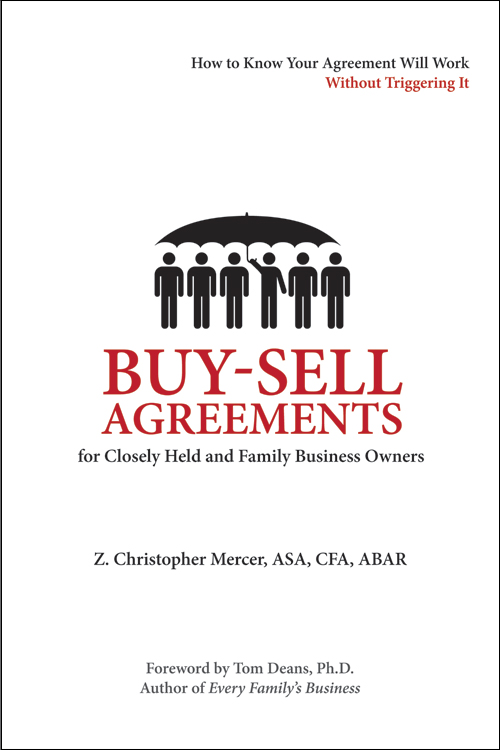Navigating Buy-Sell Agreements Part II
Three Examples Where Independent Appraisers Make the Difference
Last week, we explored the broader role of independent appraisals in providing unbiased valuations for private companies, highlighting when they are needed and how the process works.
This week, we’re diving deeper into real-world applications within buy-sell disputes, a common challenge in family enterprises where emotions, legacy, and assets often intersect.
In family-owned businesses, buy-sell agreements outline how shares are valued and transferred during events such as death, disability, retirement, or voluntary exit. However, disputes can arise when parties disagree on the company’s worth, leading to stalled transitions or costly legal battles. An independent appraisal can restore objectivity, minimize conflicts, and help directors discharge their fiduciary responsibilities.
Below, we examine three compelling reasons why engaging an independent appraiser is essential in these scenarios, with practical examples tailored to the dynamics of private family businesses.
1. Resolving Valuation Deadlocks with a Third Appraiser
One of the most structured ways independent appraisers intervene in buy-sell disputes is through the “third appraiser” mechanism, often embedded directly in the agreement itself. In many family businesses, buy-sell agreements stipulate that if the buyer and seller (or their respective appraisers) can’t agree on a fair market value, each party selects their own appraiser. If those two valuations differ significantly, a third appraiser is appointed to bring a resolution.
Consider a hypothetical yet all-too-common scenario in a multi-generational family manufacturing firm: A founding sibling wants to retire and sell their shares back to the company, but the remaining family members (who are also shareholders) believe the proposed value overstates the business’s worth. The retiring sibling’s appraiser, familiar with the family’s history, emphasizes growth potential, while the company’s appraiser focuses on current cash flows and economic headwinds, yielding a lower figure.
Enter the third appraiser.
This independent valuation expert reviews both reports, conducts their own analysis using methods like discounted cash flow and/or comparable company analyses, and delivers a valuation. The buy-sell agreement will establish the role of the third valuation, which will be binding on all parties and averaged with the existing appraisals, as well as the closer of the two appraisals, etc.
For family directors, the independent third appraiser plays an important role, providing a safeguard to further succession planning goals and fair treatment without derailing shareholder engagement.
2. Facilitating Fair Buyouts During Triggering Events
Buy-sell disputes often stem from life events that trigger mandatory share transfers, such as death or disability, where an independent appraisal is needed to establish an equitable price and prevent under- or over-valuation. In family businesses, these events can amplify tensions if the agreement lacks clear valuation protocols, leading to disagreements over asset management or other strategic finance decisions.
Take the case of a family real estate holding company where a key shareholder passes away unexpectedly. The buy-sell agreement requires the estate to sell shares back to surviving family members at fair market value, funded perhaps through life insurance proceeds. However, the estate’s executors argue that recent property appreciations and development projects justify a higher valuation, while the survivors point to outstanding debts and market volatility. An independent appraiser is engaged to measure the fair market value of the shares using methods under the asset-based, income, and market approaches, as appropriate.
The independent valuation ensures that the buyout is fair to the estate without jeopardizing the company’s future. It also supports estate planning by providing defensible documentation for tax purposes, prepared to withstand IRS scrutiny. For family owners, a reasonable, well-documented independent valuation helps to preserve financial stability while honoring the deceased’s legacy while being fair to all parties.
3. Mitigating Litigation Risks in Shareholder Conflicts
When buy-sell disputes escalate to litigation—such as in partnership dissolutions or family feuds—an independent appraisal becomes indispensable for providing expert testimony and evidence-based resolutions. This is particularly relevant in family businesses where shareholder engagements turn contentious, perhaps due to differing visions on management or dividend policy.
Imagine a scenario where two siblings, both shareholders, disagree on a voluntary buyout of their family business. One wants to exit to pursue other ventures, claiming the business’s value has surged, while the other insists on a lower price, citing supply chain disruptions.
The dispute heads to mediation or court, where a qualified independent appraiser can serve as an expert witness, delivering a comprehensive report that dissects the company’s financials, market comparables, and growth forecasts, setting forth the rationale for the conclusion in a concise and compelling manner for the court. The prospect of such testimony to quantify damages or validate claims often leads to settlements that avoid prolonged trials.
In family contexts, independent appraisal not only resolves the immediate conflict but also reinforces governance practices, like regular updates to buy-sell agreements.
Wrapping Up
These examples illustrate the need for independent appraisers to help ensure fairness in buy-sell disputes, turning potential pitfalls into opportunities for strengthened governance. If your family business is reviewing its buy-sell agreement or facing a transition, consider consulting a qualified independent appraiser early. It could be the key to safeguarding your legacy.

Buy-Sell Agreements for Closely Held and Family Business Owners
If you are a business owner or an adviser to business owners, this book is designed for you, providing a roadmap for business owners to develop or improve their buy-sell agreement.
 Family Business Director
Family Business Director 











